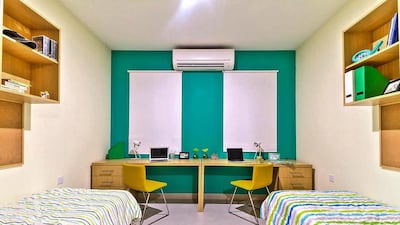GSA Group, the developer and investor in student property based in Dubai, is targeting Spain as its next major international growth market.
The company, which alongside Singaporean sovereign wealth fund GIC bought portfolios in the UK and Germany this month containing 4,600 student beds and 5,000 more under development, is looking to acquire more properties across Europe and to push into the US, as well as broaden its footprint in the UAE.
Founder and chairman Nicholas Porter said that “Spain is a good example” of a market where he sees potential for opening new purpose-built student accommodation (PBSA).
“We like that market and the markets within. And ultimately our fight over the next two or three years will be to the US as well – bringing new product and new thinking to the US market. It’s not about being all over the US. It’s about being in major centres that continue to grow and attract both domestic and international students.”
Mr Porter was the founder of UK-based Unite Group, which was a big player in the development of the PBSA sector in the UK in the 1990s and 2000s. Unite now has about 50,000 student beds in its portfolio, and 5,000 more under development.
He left the firm in 2009 – one year after setting up GSA Group in a bid to develop the PBSA sector globally. The company has interests in seven countries, but envisages scope for much greater growth and has a target to have 250,000 student beds under management by 2025.
Much of this will be in markets such as Germany, where there are few existing PBSA buildings.
“Germany is where the UK market was about 20 years ago in terms of accommodation,” said Mr Porter. “It has a great higher education system and a huge amount of credibility, but accommodation-wise it is very much first generation.”
However, even in more developed markets such as the UK, Mr Porter sees opportunities both for new schemes and for replacing some of the first wave of PBSA stock that was built in the 1990s. A World Student Housing report published by property consultancy Savills this month stated that 2015 was a record year for student property, with $15 billion invested in the sector. There was $8bn worth of investment in the first eight months of 2016. Despite this, it argued that supply remains low, with provision rates (beds per enrolled students) ranging from 24 per cent in the UK to just 6 per cent in Spain.
James Hanmer, a director of student housing investment at Savills, said that one reason that rates in Spain were lower than in other European countries is that the number of international students studying there is lower than in other major European countries at about 75,000, compared with between 300,000 or 400,000 in the UK, France or Germany.
Another is that “a lot of the students are living at home and going to the local university”.
However, he argues that there are substantial opportunities for the sector’s development across continental Europe.
“In Europe you are still getting that first-over advantage … there’s not much competition,” said Mr Hammer. “But you are higher up the risk curve because it is not a product that is wholly proven in terms of demand.”
The Savills report also highlights the UAE as the market with the most branch campuses of overseas universities – 42, compared with 37 in China and 17 in Malaysia.
Mr Porter said that the company is still searching for a site for its second Dubai campus, and believes the market could accommodate many more.
“We’re looking at 3,000-4,000 beds in Dubai, and we certainly want to be in Abu Dhabi as well. And from the UAE we’ll look at select markets as they open up around the GCC.”
mfahy@thenational.ae
Follow The National's Business section on Twitter


